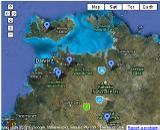Search this site
- Enjoy Darwin
- This Page
Please check with the advertised contact for any updates or changes to an advertised service.
Awesome Whale Watching
by Shiela Apura
Whales are fully aquatic marine mammals. They are creatures of the open ocean. They give birth, feed, and raise their young at sea. Their extreme adaptation to underwater life makes them unable to survive on land. They breathe air regularly, though they remain submerged for long periods.
Australia is one of the best places for whale watching. You can see them on the coast paths. These majestic animals are known all over the world for their size and gentleness amongst humans near them. Whales have also been in the minds of literary artists as is the case of Moby Dick, a novel by Herman Melville. To have a more detailed look at these amazing creatures, here is a checklist of the important things to know before you go whale watching:
Helpful Tips Before Embarking
Determine the Best Time and Place for Whale Watching
A lot of whale watching gold coast tours starts the season from May to November. While Alaska, Canada, Arctic, and New Zealand cite June as the best season for whale watching. In July and August, you will find whales in Argentina, Tonga, and the Lofoten Islands. In Australia, the best time to see the blue whale is from September to December.
Your guide will determine the best time for whale watching depends on the kind of whale you want to see. For blue whales appearing along the Baja California Peninsula on America’s west coast, the best season is from January to February. If you want to go to Argentina and Greenland, March is the best month to visit. During April, you can visit Ireland, Sri Lanka, Hawaii, Greenland, and the Canary Islands.
Dress Appropriately for the Occasion
The place for whale watching is cold and windy, so wear layers if necessary. Since you are on the water, bring extra clothes with you, so you have something to change into if you get wet from the waves splashing against your vessel.
Wear an appropriate clothing and shoes, and bring water-proof photography device . On a moving boat, high heels are not a good option. So opt for rubber-soled shoes.
Know the Different Precautionary Measures for Whale Watching
Pay close attention to the whale’s behavior when venturing into open waters, be extra cautious. Do not be unruly and horse around while on deck. Whale watching is an activity that requires silence and patience. Your tour guide will not hesitate to go back to shore when you become noisy or reckless.
Be sensitive to the changes in the whale's behaviour because that could indicate a sign of distress. If tail slapping or a rapid shift in the swimming pattern appears, your guides will then advise the tour group to leave the area immediately.
Pack Some Medications for Seasickness
Ocean waters are a bit calmer in the morning. To avoid seasickness, make sure to bring some seasick medicine. It must be taken at least one hour before a trip. However, if you do not have a seasickness problem, then you can have whale watching any time of the day.
Whale Watching May be Boring for the Kids
The two to four hours tour may be a relaxing cruise for the adults. However, kids may not like the standing and waiting involved. Children may find a whale watching boat tour boring. Your guide may not allow bringing in children under a certain age because of their cries. A loud shriek may scare off whales and other creatures. A better option is a whale watching safari which involves spotting them from the land.
You May Also See Dolphins
A lot of whale watching tours guarantee that you will see a whale during your cruise. Aside from getting to view whales, you may also see dolphins. Dolphins are a good sign when it comes to whale watching because dolphins often go along with whales due to the feeding habits of some whales.
A typical pattern in their feeding habits is that whale go for krill or plankton. These krill are food for a lot of fish which are in turn food for dolphins. This occurrence is the reason why a lot of commercial fishing vessels consider dolphins and whales as a good luck charm when catching fish. The International rules also mandate these fishermen to be extra careful with their nets when catching fish to avoid any accidents with whales and dolphins.
It is a Once-in-a-Lifetime Experience
Going on a whale watching expedition is going to be a once-in-a-lifetime experience. A close encounter with the whale is a unique adventure. Indeed, personally seeing the whales is a magnificent sight.
Whale watching boats are large with whale and dolphin friendly design features. It provides the guests with a relaxing whale watching experience. It contains areas which are perfect for photos.
Before going for a whale watching, it is also exciting to know the different kinds of whales. Here are some of the examples:
• Blue Whale - It is a marine mammal and with up to 29.9 meters in length.
• Humpback Whale - It has long pectoral fins, a knobbly head, and range in length from 12–16m.
• Bowhead Whale - It has stocky dark colour, without a dorsal fin, and can grow 14 to 18 m in length.
•North Atlantic Right Whale - It has callosities on its head and a broad back without a dorsal fin. Its body is black or very dark grey, sometimes with white patches on the belly.
•Gray Whale - It has grey patches and white mottling on its dark skin and with a length of about 14.9 meters.
Takeaway
For most of the adventurous people, watching whales in the wide sea is an awesome experience. When they sign-up for a whale watching tour, they are hoping to experience that spectacular moment. And, very often, it exactly happens. It is very rare to have such an intimate experience with these animals, and it is something that most people will never get the chance to do. Thus, this amazing moment needs preparation to make it a successful one.Darwin Community
Add your own Information or Comment on Articles in these Community Pages.
Community
- Art & Craft
- Clubs & Groups
- Community Forum
- Fishing
- Fishing Clubs
- Musicians
- Social Dancing
- Sports & Recreation
- Survival Guide
- Venues for Hire
Buy/Sell
History
 Community Banks® return profits to the community.
Community Banks® return profits to the community.











